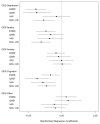Predictors of patient self-ratings of quality of life in Alzheimer disease: cross-sectional results from the Canadian Alzheimer's Disease Quality of Life Study
- PMID: 21946804
- PMCID: PMC3267777
- DOI: 10.1097/JGP.0b013e3182006a67
Predictors of patient self-ratings of quality of life in Alzheimer disease: cross-sectional results from the Canadian Alzheimer's Disease Quality of Life Study
Abstract
Objectives: To assess whether the core symptoms of Alzheimer disease (AD) consistently predict patient self-rated quality of life (QOL) as assessed by a variety of QOL measures in a large national sample of AD patients.
Design: Cross-sectional.
Setting: Fifteen dementia and geriatric clinics across Canada.
Participants: Community-living patients with AD (n = 370) with Mini-Mental State Exam (MMSE) scores greater than 10.
Measurements: Patients rated their QOL by using two utility indexes, the European QOL-5 Dimensions and the Quality of Well-Being Scale, a global QOL Visual Analog Scale, and the disease-specific QOL-AD instrument. Cognition was assessed with the AD Assessment Scale-Cognitive subscale and MMSE, function with the Disability Assessment for Dementia, and behavioral and psychological symptoms with the Neuropsychiatric Inventory and the Geriatric Depression Scale (GDS). One-way analysis of variance and fully adjusted multiple linear regression were used to assess the relationship between core dementia symptoms and QOL ratings.
Results: The QOL measures had only small-to-moderate correlations with each other. For all QOL measures, patient ratings were significantly lower among patients with more depressive symptoms. In multivariable analyses, the GDS score was the only significant independent predictor of patient self-ratings for all four QOL measures.
Conclusions: Self-rated symptoms of depression were a consistent independent predictor of patient-rated QOL across diverse QOL measures, while performance-based measures of cognition and informant-based functional status were not. These findings confirm the importance of identifying and treating depression in patients with AD and endorse the use of measures of self-rated depressive symptoms and QOL as outcomes in AD clinical trials.
Conflict of interest statement
There are no conflicts to report relating to this study.
Figures

References
-
- Burns A, Iliffe S. Alzheimer’s disease. BMJ. 2009;338:b158. - PubMed
-
- Raina P, Santaguida P, Ismaila A, et al. Effectiveness of cholinesterase inhibitors and memantine for treating dementia: evidence review for a clnical practice guideline. Ann Intern Med. 2008;148:379–397. - PubMed
-
- Mack JL, Whitehouse PJ. Quality of Life in Dementia: State of the Art - Report of the International Working Group for Harmonization of Dementia Drug Guidelines and the Alzheimer’s Society Satellite Meeting. Alzheimer Dis Assoc Disord. 2001;15:69–71. - PubMed
-
- Guyatt GH, Feeny DH, Patrick DL. Measuring health-related quality of life. Ann Intern Med. 1993;118:622–9. - PubMed
-
- Kopec JA, Willison KD. A comparative review of four preference-weighted measures of health-related quality of life. Journal of Clinical Epidemiology. 2003;56:317–325. - PubMed
Publication types
MeSH terms
Grants and funding
LinkOut - more resources
Full Text Sources
Medical

